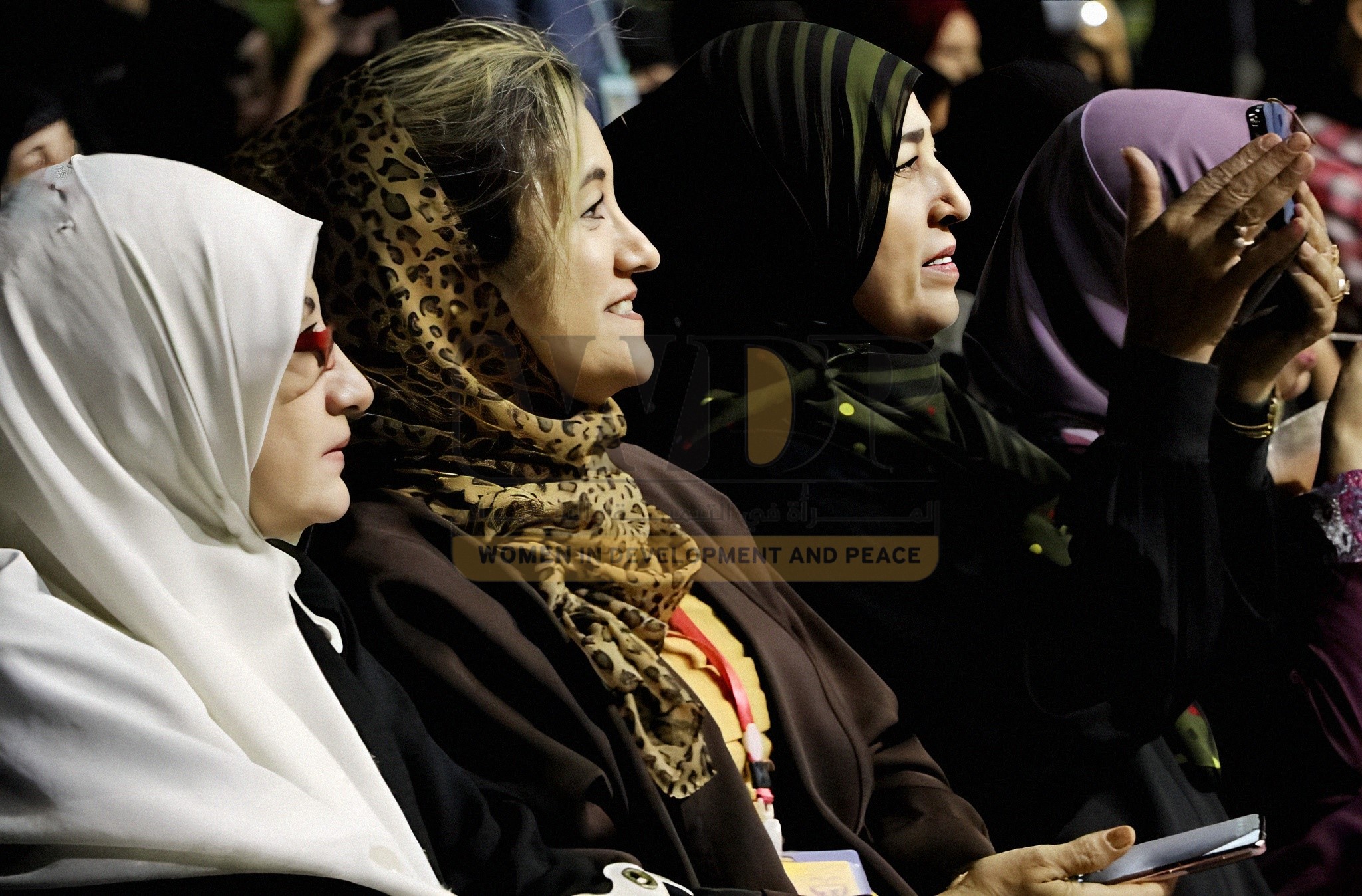Women in Development and Peace – Hebah Mohammed
Yemeni women are a true force in the business and economic world. They are driven by passion and determination to achieve excellence and success in various sectors. Their economic empowerment and support in freelance work are crucial for achieving sustainable development in Yemen.
In this report, we will learn about the importance of empowering Yemeni women economically and their vital role in business sectors. We will also take a comprehensive look at the main business sectors in which Yemeni businesswomen work, from agriculture and trade to local products and handicrafts, and their distinctive industrial and commercial activities.
Active Participation of Yemeni Women
“Yemeni women are actively participating in various business sectors, demonstrating the necessary skills and knowledge for success. This active engagement reflects a significant development in Yemen’s economic and commercial culture. Yemeni women contribute effectively to building various business sectors and boosting the economy.
Businesswoman Wahda Al-Ma’bari says: “Public works are vital sectors witnessing active female participation in Yemen. These sectors include developing and improving infrastructure and public services in the country, such as roads, bridges, and public buildings. Businesswomen participate in a wide range of projects in this sector, contributing to strengthening infrastructure and the lives of local communities.”
She adds: “Training productive families is one of the projects in which Yemeni businesswomen participate. At “Dantel” Training and Rehabilitation Center, we provide training and guidance to productive families in various fields such as sewing and confectionery, teaching them various vocational skills. It aims to develop their skills and enhance their productivity. This training helps women improve their income and achieve economic independence.”
Jawahir Ali, Director of the Union for Microfinance Program in Yemen, says: “The most prominent sectors in which Yemeni businesswomen work are industrial, commercial, and agricultural. The most prominent industrial activities are sewing and handicrafts such as ceramics and wool, incense and perfume making, and pickles.”
She adds: “The present time is witnessing an industrial trend for women towards producing pastries, cakes, and meals through e-commerce. Let’s not forget women in rural areas; many of them work in agriculture and animal husbandry.”
Yemen maintains its rich traditions and culture, and businesswomen participate in preserving these traditions through traditional industries. Al-Ma’bari explained that many Yemeni women work in carpet making, embroidery, and other traditional handicrafts and how to preserve and develop these traditional industries.
She pointed out that the education sector occupies an important position, witnessing a significant participation of women in establishing and managing private schools. Women play a vital role in enhancing the quality of education and providing a suitable educational environment for children.
She also believes that the health sectors are witnessing active participation from Yemeni women, as they work on establishing and founding medical projects and contribute to providing healthcare to the community, promoting health awareness, and accessing healthcare services.
She adds: “Yemeni women participate in the training and rehabilitation sector by establishing many training centers, as professional consultants and trainers. They provide training and advice to young people and women in various fields, such as technical, administrative, and commercial skills, which enhances obtaining job opportunities and developing skills.”
Jawahir Ali confirmed that Yemeni women play an active role in reviving the Yemeni economy by providing unique products in the agricultural, productive, and commercial sectors. They help enrich the Yemeni market with various categories of high-quality local products, noting that the sectors witnessing remarkable growth for businesswomen are the productive and service sectors.

For her part, Yemeni businesswoman Sabah Badri Bakir says: “Recently, businesswomen have succeeded in entering many economic sectors, such as contracting, real estate, import and export, public services, customs clearance, handicrafts and heritage, and other various commercial activities such as opening phone shops, beauty and clothing stores, and cafes as well.”
Economic Empowerment of Women and its Importance
In light of the economic and social challenges faced by Yemeni women, the question comes to mind about how to enhance their role, empower them economically, and engage them in freelance work. Empowering Yemeni women with economic opportunities in the free sector is a matter of social justice and achieving gender equality, in addition to its great importance in promoting economic development and achieving societal stability.
Al-Ma’bari says: “Since women represent half of society and half of the market, their economic empowerment enhances economic growth in general, and when women participate in freelance work and enjoy equal opportunities for work and economic participation, productivity is enhanced and employment and income opportunities are provided.”
“When women are actively involved in freelance work and economic activity, they bring positive changes in society, and when women can earn income and achieve financial independence, their ability to improve their living conditions and the lives of their families increases; This, in turn, leads to strengthening the economic independence of the entire family and creates opportunities for achieving sustainable development and improving the standard of living, “according to Al-Ma’bari.
While Bakir believes that the economy will grow rapidly in Yemen if businesswomen are given all the facilities and overcome the challenges they face and that when comparing them to businesswomen outside Yemen, we notice that the capabilities are harnessed for them and they can invest heavily, and some businesswomen own factories Import and export”.
 Sarah Sallam, a researcher in economic empowerment, pointed out that empowering women economically and engaging them in freelance work enhances their innovation and creativity, as Yemeni women have unique abilities and talents, and they know the challenges and needs of society from a different perspective; Therefore, empowering women contributes to promoting diversity and inclusion in the labor market, and enhances innovation and economic growth.
Sarah Sallam, a researcher in economic empowerment, pointed out that empowering women economically and engaging them in freelance work enhances their innovation and creativity, as Yemeni women have unique abilities and talents, and they know the challenges and needs of society from a different perspective; Therefore, empowering women contributes to promoting diversity and inclusion in the labor market, and enhances innovation and economic growth.
Regarding the economic role of empowering Yemeni women in achieving sustainable development, Al-Ma’bari says: “Women, whether they are entrepreneurs or workers in the private or public sector, play a vital role in stimulating economic growth and activating the market in Yemen, and establishing their own businesses and managing them is one of the most prominent ways that businesswomen perform to enhance economic growth.” Sallam believes that when a woman takes responsibility for establishing and operating her own business, she contributes effectively to increasing job opportunities and providing employment opportunities for others; She works to provide new job opportunities and enhance the economic sustainability of the local community.
She continues: “Yemeni businesswomen contribute to diversifying the local economy and enhancing economic growth by providing new and innovative products and services. On the other hand, Yemeni businesswomen have played an important role in improving the economic scene in light of the difficult economic situation by enhancing training and professional rehabilitation, and developing the capabilities of female workers; They contributed to raising the level of education and training female workers, and increasing employment opportunities for vulnerable groups.”
Successful Attempts
Despite the difficult circumstances in Yemen, there are inspiring success stories of Yemeni women in various fields. Wahda Al-Ma’bari mentions the experience of Narmeen Asaj in establishing a water park in Al-Majliya area south of Taiz City. Despite the challenges facing Yemen in general and Taiz in particular, Narmeen managed to achieve her vision and establish a unique water park through her determination and belief that Yemeni businesswomen can face challenges.
Challenges
In the complex Yemeni reality, Yemeni women face numerous challenges in their business activities and daily lives, which can affect the success of their projects and their economic empowerment. Among these challenges, Al-Ma’bari explains that Yemen has been living in a state of continuous internal conflict for a long time, which has led to the displacement and dispersal of many families. Displaced women face particular challenges, as they lack stability and security, which affects their ability to establish sustainable businesses. However, community solidarity and mutual support among women can help overcome this challenge and rebuild their lives and businesses.
Sarah Sallam points out that “Yemen is experiencing a severe economic crisis; this significantly affects working women and the businesses they run. The lack of economic opportunities and high unemployment rates hinder business growth and limit its stability. Despite this, Yemeni women can take advantage of available opportunities and shift towards emerging and creative sectors, such as handicrafts and e-commerce, to achieve financial independence and strengthen the local economy.”
She also mentioned that many Yemeni women suffer from a lack of financial knowledge and awareness, which prevents them from understanding basic financial concepts and applying them in their businesses. Financial literacy for women can be enhanced by providing financial training and guidance and promoting financial awareness in society, enabling women to manage their finances better and make sound decisions.
“Businesswomen face the challenge of limited purchasing power of customers, as this affects sales volume and revenue. This is related to the limited income level of the community or changes in economic conditions. Fluctuations in exchange rates affect women’s businesses, especially if they rely on importing goods, as changes in the currency value can lead to increased import costs and others,” she added.
She explained that Yemeni businesswomen also face difficulties in import and export procedures, which complicates international trade and affects the time and effort spent in completing the necessary procedures, and difficulties in obtaining the necessary legal empowerment to support their economic activity.
Businesswoman Khawla Al-Sharafi added that women in Yemen face challenges from negative customs and traditions that limit their ability to fully participate in economic life and make independent decisions. According to Al-Sharafi, changing the reality of customs and traditions requires doubling efforts from various influential societal parties, especially those working in awareness and education, and empowering Yemeni women to participate in decision-making and achieve financial independence.
Jawahir Ali points out that one of the challenges facing businesswomen is the limited view of Yemeni society towards them and the underestimation of their ability to manage their projects and activities, as well as the high price of inputs, changing exchange rates from time to time, selling on credit, and other challenges.

